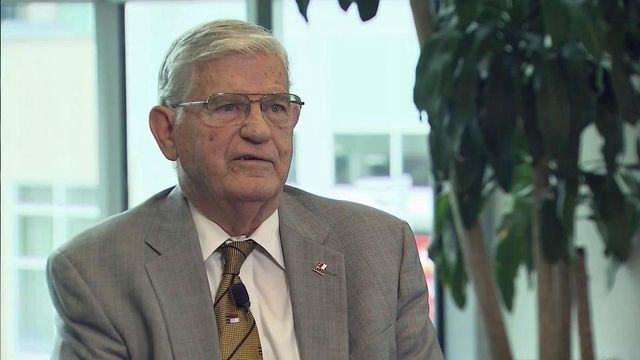High-profile group wants to quell HB2 furor
A group of conservative and liberal leaders say they hope to pave the way for conversation and accommodation on HB2.
Posted — UpdatedThe group would be led by former Lt. Gov. Dennis Wicker, a Democrat, and Raleigh businessman Art Pope, a prominent Republican donor who served as Gov. Pat McCrory's budget director. John Hood, a leader in North Carolina's conservative circles, is also helping to organize the effort, and former Republican Gov. Jim Martin has agreed to serve as one of several honorary chairmen.
"That is what I proposed. That we say we are going to lay down our weapons here for a while and give all of us a chance to talk together and try to learn a little something," Martin said.
Hood said the group hopes to tap around a dozen people from different walks of life, such as school leaders, businessmen and advocates on either side of the issue.
"North Carolina is a place of very opinionated people who disagree often, but this can show we're willing to talk about it," Hood said.
If successful, he said, the working group would forge at least some legal fixes that might tamp down opposition to the bill. On other topics related to House Bill 2, he said, they may have to settle for lowering the level of vitriol in the dialogue.
In an interview with WRAL News last week, Martin said that he hoped all sides could take a step back from the rhetoric surrounding the bill.
"That is what I propose, that we say we are going to lay down our weapons here for a while and give all of us a chance to talk together and try to learn a little something," Martin said.
Nationally, House Bill 2 is known as the "bathroom bill." It reversed a Charlotte nondiscrimination ordinance that would have required local businesses to allow transgender individuals to use the bathroom or locker room of their choosing. The state law now says businesses can set their own policies, but for publicly owned changing facilities and restrooms – whether in a public school, university, state facility or city-owned pool – people must use the locker room corresponding with the sex noted on their birth certificate.
"The Democratic majority on the City Council didn't give a hoot what the conservatives were concerned about. They were going to do what they were doing to do," Martin said.
However, the bill goes further. It establishes the first statewide nondiscrimination law but specifically excludes gay and transgender people from those protections and prohibits cities and counties from adding LGBT protections in many instances. It also ends wrongful termination lawsuits in state court, meaning that people suing employers for age, sex, race and other forms of discrimination must use the more costly and time-limited federal system.
"Here come a bunch of amendments to take away access to the courts, to do this, to do that, and it just became a debacle that has become very embarrassing and damaging to the state's economy," Martin said.
The bill has drawn national opprobrium, sparking concert cancelations, late-night talk show gibes, outrage from business leaders and lawsuits, including a U.S. Department of Justice discrimination suit against the state and the University of North Carolina system. The true economic costs are hard to pin down, but Martin said last week that the tit-for-tat between the state and City of Charlotte had cost North Carolin in reputation and commerce.
"You can't really wait for an initial show of good faith," Hood said. "There needs to be some high-level discussion immediately."
Hood said the working group he is helping to assemble could potentially come up with some agreed-upon fixes that people on both sides of the issue could agree with. For the issues that can't be negotiated, he said, there could at least be conversation and a better understanding of both sides' points of view.
He said a locally negotiated solution was preferable to waiting for courts to settle the matter because litigation can take years of arguments and appeals before it is finally settled.
"I'm not sure we can wait," Hood said.
Although both sides may not agree on everything, Martin said it is important that people start talking to each other again.
"I have not heard a better solution for something to do right now, to put a stop to all the anguish we are going through," he said.
Related Topics
• Credits
Copyright 2024 by Capitol Broadcasting Company. All rights reserved. This material may not be published, broadcast, rewritten or redistributed.





